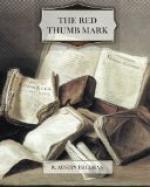CHAPTER I
MY LEARNED BROTHER
“Conflagratam Anno 1677. Fabricatam Anno 1698. Richardo Powell Armiger Thesaurar.” The words, set in four panels, which formed a frieze beneath the pediment of a fine brick portico, summarised the history of one of the tall houses at the upper end of King’s Bench Walk and as I, somewhat absently, read over the inscription, my attention was divided between admiration of the exquisitely finished carved brickwork and the quiet dignity of the building, and an effort to reconstitute the dead and gone Richard Powell, and the stirring times in which he played his part.
I was about to turn away when the empty frame of the portico became occupied by a figure, and one so appropriate, in its wig and obsolete habiliments, to the old-world surroundings that it seemed to complete the picture, and I lingered idly to look at it. The barrister had halted in the doorway to turn over a sheaf of papers that he held in his hand, and, as he replaced the red tape which bound them together, he looked up and our eyes met. For a moment we regarded one another with the incurious gaze that casual strangers bestow on one another; then there was a flash of mutual recognition; the impassive and rather severe face of the lawyer softened into a genial smile, and the figure, detaching itself from its frame, came down the steps with a hand extended in cordial greeting.
“My dear Jervis,” he exclaimed, as we clasped hands warmly, “this is a great and delightful surprise. How often have I thought of my old comrade and wondered if I should ever see him again, and lo! here he is, thrown up on the sounding beach of the Inner Temple, like the proverbial bread cast upon the waters.”
“Your surprise, Thorndyke, is nothing to mine,” I replied, “for your bread has at least returned as bread; whereas I am in the position of a man who, having cast his bread upon the waters, sees it return in the form of a buttered muffin or a Bath bun. I left a respectable medical practitioner and I find him transformed into a bewigged and begowned limb of the law.”
Thorndyke laughed at the comparison.
“Liken not your old friend unto a Bath bun,” said he. “Say, rather, that you left him a chrysalis and come back to find him a butterfly. But the change is not so great as you think. Hippocrates is only hiding under the gown of Solon, as you will understand when I explain my metamorphosis; and that I will do this very evening, if you have no engagement.”
“I am one of the unemployed at present,” I said, “and quite at your service.”
“Then come round to my chambers at seven,” said Thorndyke, “and we will have a chop and a pint of claret together and exchange autobiographies. I am due in court in a few minutes.”
“Do you reside within that noble old portico?” I asked.
“No,” replied Thorndyke. “I often wish I did. It would add several inches to one’s stature to feel that the mouth of one’s burrow was graced with a Latin inscription for admiring strangers to ponder over. No; my chambers are some doors further down—number 6A”—and he turned to point out the house as we crossed towards Crown Office Row.




